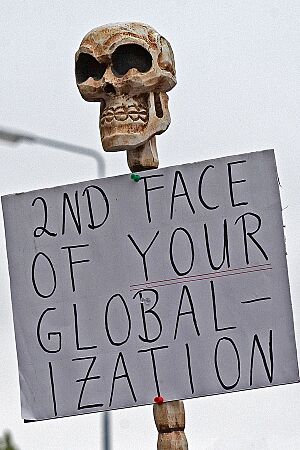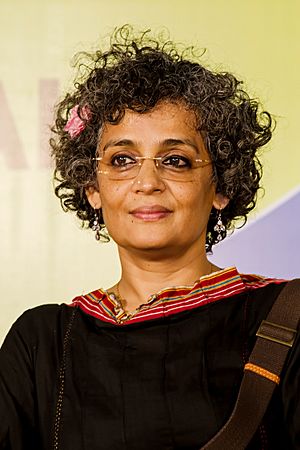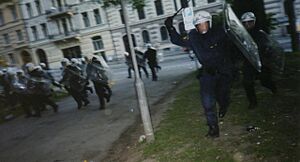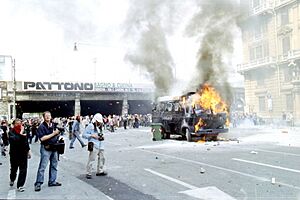Anti-globalization movement facts for kids
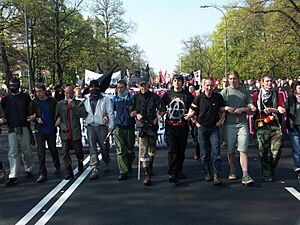
The anti-globalization movement is a group of people and organizations who are critical of how the world's economies are becoming more connected. They are also known as the global justice movement or the alter-globalization movement. There isn't just one way to define what "anti-globalization" means.
People in this movement share a common concern: they don't want large, international companies to have too much power without rules. They believe these companies gain power through big trade deals and financial markets that aren't controlled enough. These companies are often accused of caring more about making money than about safe working conditions, fair pay, protecting the environment, or respecting a country's laws and independence.
Contents
What the Movement Believes In
Supporters of this movement believe that by the late 1900s, powerful groups tried to use the growth of world markets for their own benefit. They call this "globalization from above." In response, many social movements started to challenge this power. These movements are known as "anti-globalization" or "globalization from below."
Why They Oppose Big Institutions and Companies
People in the anti-globalization movement believe that international agreements and big financial groups like the International Monetary Fund (IMF) and the World Trade Organization (WTO) take away local control. They say that large companies use these groups to help their own business interests. This allows big companies to do things that regular people or small businesses cannot. For example, they can:
- Move their operations easily across different countries.
- Take valuable natural resources from various places.
- Use many different types of workers around the world.
The movement wants to stop the idea that companies have the same legal rights as people. They also want to end extreme privatization (selling public services to private companies) pushed by the World Bank, the IMF, and the WTO.
Activists especially oppose what they see as unfair practices caused by globalization. They believe international groups promote policies that don't care enough about ethics or protecting the environment. Common targets include the World Bank, IMF, and WTO. They also oppose certain free trade agreements.
They argue that free trade without rules to protect the environment and workers will only make rich countries (the "North") more powerful than developing countries (the "South"). They call this "polarization." They say that current economic policies have given wealthier nations an advantage, leading to them taking advantage of developing nations and making the global wealth gap wider.
A report by Jean Ziegler, a UN expert on the right to food, said that farmers in both developing and rich countries are losing their way of life. He concluded that the current global trading system, especially under the WTO, makes things worse because of the unequal power between member countries. Activists point out that rich countries heavily support their own farming, which makes it hard for farmers in developing nations to compete.
Global Opposition to Certain Economic Ideas
Thanks to the Internet, a movement grew against certain economic ideas called neoliberalism. These ideas became very popular in the 1990s. For example, the Organisation for Economic Co-operation and Development (OECD) suggested making it easier for companies to invest and trade across borders. This plan was stopped in 1998 because of strong protests from people and groups around the world.
Neoliberal ideas suggested that free trade and fewer government rules would help poor countries and disadvantaged people in rich countries. But anti-globalization supporters argue that protecting the environment, human rights (especially workplace rights), and democracy might be at risk if there aren't strong rules attached to free trade.
Noam Chomsky, a famous thinker, said in 2002 that the term "globalization" has been used by powerful people to mean a specific type of world economy that mostly benefits investors, not regular people. He said that people who want other kinds of global cooperation are wrongly called "anti-globalization." He believes no sensible person is against international cooperation, especially not workers' movements that are built on global teamwork.
Anti-War Movement
By 2002, many parts of the movement strongly opposed the upcoming invasion of Iraq. Millions of people protested worldwide on February 15, 2003, against the war. Other anti-war protests were also organized by the anti-globalization movement. For example, a large protest against the war closed the first European Social Forum in November 2002 in Florence, Italy.
Anti-globalization activists were worried about how democracy was working. They saw that leaders in many democratic countries (like Spain, Italy, Poland, and the United Kingdom) supported the war even though most of their people were against it. Chomsky said these leaders "showed their contempt for democracy." Many in the movement see economic issues and war as closely connected.
What to Call the Movement
The movement doesn't have one single name because it doesn't have one leader or a single agreement on what to call itself. It's been called many things, often related to its goals of social change, justice, and opposing certain types of capitalism. Activists also didn't want to use names given by the media that might make their protests seem bad. Also, some activists aren't against globalization itself, just certain parts of it.
Many people involved, like Noam Chomsky, think "anti-globalization" is the wrong term. They say it makes it sound like they support protectionism (protecting a country's own industries) or nationalism (strong loyalty to one's own nation), which isn't always true. For example, the No Border network wants people to be able to move freely across all borders.
Some activists, like David Graeber, see the movement as being against neoliberalism or "corporate globalization." He argues that the media created the term "anti-globalization." He believes radical activists are actually more in favor of globalization, meaning "borders disappearing and people, things, and ideas moving freely," than groups like the IMF or WTO. The term "alter-globalization" is used to make this difference clear.
While "anti-globalization" came from opposing free-trade agreements, many participants say they only oppose certain parts of globalization. They prefer to call themselves "anti-capitalist" or "anti-corporate."
Nationalist Opposition to Globalization
The term "anti-globalization" doesn't separate the international left-wing view from a purely nationalist view. Many nationalist groups, like the French National Front or the Austrian Freedom Party, also oppose globalization. However, they believe the solution is to protect the nation-state. Other groups with different political views are also against globalization. But their overall ideas are rejected by groups like Peoples Global Action and anti-fascist movements.
Influences on the Movement
Several important books and thinkers have inspired the anti-globalization movement. No Logo by Canadian journalist Naomi Klein criticized how big companies make products and how brands are everywhere in popular culture. This book became a key text for the movement.
In India, thinkers like Vandana Shiva, an ecologist, have influenced the movement. Her book Biopiracy shows how the natural resources and knowledge of local people are taken and turned into private property without sharing the benefits. The writer Arundhati Roy is known for her anti-nuclear views and her activism against a huge dam project in India, which was supported by the World Bank.
In France, the monthly newspaper Le Monde Diplomatique has supported the anti-globalization cause. Its editor, Ignacio Ramonet, helped start the group ATTAC. Susan George has also influenced the movement with her books on hunger, debt, and capitalism since 1986.
The works of Jean Ziegler, Christopher Chase-Dunn, and Immanuel Wallerstein have explained how some parts of the world remain undeveloped and dependent within the capitalist system. Ideas of peace and anti-imperialism have also strongly shaped the movement. Critics of United States foreign policy like Noam Chomsky are widely respected within the movement.
Some economists, even if they support capitalism, have influenced the movement because they don't agree with the neoliberal approach of international economic groups. Amartya Sen (a Nobel Prize winner) argued that development in poorer countries should be about improving human abilities, not just increasing income. This means focusing on health and education. James Tobin (another Nobel Prize winner) suggested a tax on financial transactions, which is now part of the movement's goals.
Also, George Soros, Joseph E. Stiglitz (a Nobel Prize winner and former World Bank official), and David Korten have argued for more transparency, debt relief, and better corporate social responsibility. Korten and Stiglitz have even joined protests.
In some Catholic countries like Italy, religious leaders, especially missionaries who have worked in the Third World, have influenced the movement.
Online sources and free-information websites, like Indymedia, help spread the movement's ideas. The vast amount of information on spiritual movements, anarchism, and the Green Movement available online has been very influential.
How the Movement is Organized
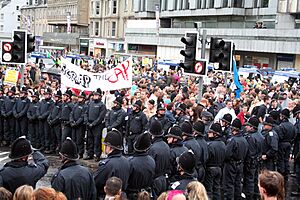
While the movement has recently focused more on creating local alternatives to capitalist globalization, its most visible way of organizing is through large, spread-out protests and peaceful disobedience. This way of organizing, sometimes under the name of the Peoples' Global Action network, tries to connect many different causes into one global effort.
For activists, the process of organizing is often more important than the specific goals achieved by any part of the movement.
At meetings of big companies or world leaders, the goal of most protests is to stop the meetings. Even though protests rarely do more than delay or inconvenience the meetings, this goal motivates people and gives them a clear, short-term purpose. This kind of public attention costs police time and public money. Riots have happened at some protests, for example in Genoa, Seattle, and London. A lot of damage was done to businesses, including McDonald's and Starbucks restaurants.
Even without formal coordinating groups, the movement successfully organizes large protests globally. They use information technology to share information and plan. Protesters organize into "affinity groups," which are usually small, non-hierarchical groups of people who live near each other and share a political goal. These groups send representatives to planning meetings. However, because police can join these groups, important plans are often not made until the last minute.
One common protest tactic is to divide into groups based on how willing people are to break laws. This is meant to protect those who don't want to take risks from the dangers of clashing with police. For example, in Prague during the anti-IMF and World Bank protests in September 2000, demonstrators split into three groups. One group engaged in peaceful disobedience, another used "tactical frivolity" (costumes, dance, music), and a third group clashed violently with police.
These protests often become like small societies themselves. Many protesters get training in first aid and act as medics for others who get hurt. In the US, some groups provide legal help in case of arrests. Protesters often feel that major news outlets don't report on them fairly. So, some created the Independent Media Center, where protesters report on events as they happen.
Key Local Organizations
- Abahlali baseMjondolo in South Africa
- The EZLN in Mexico
- Fanmi Lavalas in Haiti
- The Homeless Workers' Movement in Brazil
- The Landless Peoples Movement in South Africa
- The Landless Workers' Movement in Brazil
- Movement for Justice en el Barrio in the United States of America
- Narmada Bachao Andolan in India
- The Western Cape Anti-Eviction Campaign in South Africa
Major Protests and Gatherings
Berlin 1988
The meetings of the International Monetary Fund (IMF) and the World Bank in West Berlin in 1988 saw strong protests. These can be seen as an early example of the anti-globalization movement. One main goal was to stop the meetings, which was not achieved.
Paris 1989
A counter-summit against the G7 group of rich nations was held in Paris in July 1989. This event was called "ça suffit comme ça" ("that is enough"). Its main goal was to cancel the debt of poorer countries. A protest gathered 10,000 people, and a large concert drew 200,000 people. This was the first anti-G7 event.
Madrid 1994
The 50th anniversary of the IMF and World Bank in Madrid in October 1994 also saw protests. An early group of anti-globalization movements came together. They tried to disrupt the bankers' parties and held other public protests under the slogan "50 Years is Enough." Some protesters were arrested.
J18 (June 18, 1999)
One of the first international anti-globalization protests happened in many cities worldwide on June 18, 1999. The protests in London and Eugene, Oregon are often mentioned. This day was called the Carnival Against Capital, or J18. It happened at the same time as the G8 Summit in Cologne, Germany.
Seattle/N30 (November 30, 1999)
The second major protest, known as N30, took place on November 30, 1999. Protesters blocked delegates from entering WTO meetings in Seattle, Washington, USA. The protests forced the cancellation of the opening ceremonies and lasted until December 3. There was a large, permitted march, and other unauthorized marches. Protesters and police clashed, with police using tear gas. Over 600 protesters were arrested. Some protesters broke windows of businesses like Nike and Starbucks.
Washington A16 (April 2000)
In April 2000, about 10,000 to 15,000 protesters demonstrated at the IMF and World Bank meeting in Washington, D.C. Police arrested many people, including journalists. A lawsuit was filed for false arrests. In 2010, the city agreed to pay $13.7 million in damages for the arrests on April 15.
Washington, D.C., 2002
In September 2002, about 1,500 to 2,000 people protested against the IMF and World Bank meetings in Washington, D.C. Many people were arrested. In 2009, the city agreed to pay $8.25 million to nearly 400 protesters and bystanders to settle a lawsuit about mass arrests.
Police Response to Protests
After the Seattle protests, police worldwide started using different tactics to prevent disruptions. These included having many officers, sending undercover officers into groups, and preparing to use force.
At some protests, police have used tear gas, pepper spray, rubber bullets, and water cannons to push back protesters. After a protest in Montreal in 2000, a tactic was introduced to divide protests into "green" (permitted), "yellow" (not officially permitted but low risk), and "red" (direct confrontation) zones.
In Quebec City, officials built a 3-meter (10-foot) wall around the area where the Summit of the Americas was held. Only residents, delegates, and certain journalists could pass through.
Gothenburg (June 2001)
On June 15 and 16, 2001, a large protest happened in Göteborg, Sweden, during a European Council meeting and a visit by George W Bush. There were clashes between police and protesters, and some extreme groups caused damage. Images of this destruction were shown widely in the media, which made the movement look bad to some people.
Genoa (July 2001)
The Genoa Group of Eight Summit protest from July 18 to 22, 2001, was one of the most violent protests in recent Western European history. Hundreds of police and civilians were injured, and hundreds were arrested. Police were later accused of brutality.
International Social Forums
The first World Social Forum (WSF) in 2001 was created to be a counter-event to the World Economic Forum held in Davos at the same time. The WSF's slogan is "Another World Is Possible." It became a regular meeting, held in different cities around the world, including Porto Alegre, Brazil; Mumbai, India; and Nairobi, Kenya.
The idea of creating a meeting place for groups and individuals who oppose certain economic ideas was soon copied. The first European Social Forum (ESF) was held in November 2002 in Florence. Its slogan was "Against the war, against racism and against neo-liberalism." It had 60,000 delegates and ended with a huge anti-war protest.
Social Forums of national and local scope were also held in many countries.
There has been some discussion within the movement about the role of these social forums. Some see them as a "popular university" to teach people about globalization problems. Others want delegates to focus on coordinating the movement and planning new campaigns.
Impact of the Movement
The global justice movement has been quite successful in reaching some of its main goals, according to activist David Graeber. For example, many countries no longer rely on loans from the IMF. By the mid-2000s, IMF lending was at its lowest level compared to the world's total economic output since the 1970s.
Criticisms of the Movement
Lack of Clear Evidence
Critics say that facts and figures don't support the views of the anti-globalization movement. These critics point to trends that they say are results of globalization and economic growth:
- The percentage of people in developing countries living on less than $1 a day has decreased in East Asia.
- The world's income per person grew more between 2002 and 2007 than ever before.
- More countries now have universal suffrage (everyone can vote).
However, members of the anti-globalization movement argue that positive data from countries like China, which largely ignored neoliberal advice, proves that pro-globalists are wrong. Economist Ha-Joon Chang argues that the idea of continuing neoliberal policies is "simply not true" when looking at the last two decades. He says that income growth in developing countries was faster before 1980 than after.
Economist Jagdish Bhagwati argues that opening up the economies of China and India helped them grow faster in the 1980s and 1990s. This growth also led to a big reduction in poverty in both countries. Economist Joseph Stiglitz said that countries that managed globalization on their own, like those in East Asia, gained huge benefits and shared them fairly. But countries where globalization was managed for them by the IMF did not do as well.
Critics of corporate-led globalization are concerned about how the World Bank collects its statistics. They argue that more detailed ways of measuring poverty should be used. According to one research center, the period from 1980 to 2005 saw less progress in economic growth, life expectancy, and child mortality.
Disorganization
One common criticism of the movement, even from some who support it, is that it lacks clear goals. The views of different protesters are often very different. Many members of the movement know this. They argue that as long as they have a common opponent, they should work together, even if their political ideas aren't exactly the same.
Lack of Effectiveness
Opponents of the anti-globalization movement often argue that a major cause of poverty for farmers in poorer countries is the trade barriers put up by both rich and poor nations. The WTO is an organization set up to remove these barriers. Therefore, they argue, people who truly care about poorer countries should support free trade, not fight it. For example, products like sugar are heavily supported by rich countries, which makes it hard for farmers in other countries to compete.
Many supporters of globalization believe that different policies should be followed, though not necessarily those suggested by the anti-globalization movement. For example, some see the World Bank and IMF as corrupt groups that have given loans to dictators who never make reforms. Others argue that much of the poverty in poorer countries is caused by a lack of clear laws and property rights.
Not Enough Support in Developing Countries
Critics have said that people in poor and developing countries have generally accepted and supported globalization. They argue that the strongest opposition comes from activists and groups in wealthier developed countries. Some critics accuse the anti-globalization movement of focusing on problems in developing countries to avoid dealing with issues in Western countries. They also claim that the movement has failed to get widespread support from poor and working people in developing nations.
These critics say that people in the Third World see the anti-globalization movement as a threat to their jobs, wages, and way of life. They believe that stopping or reversing globalization would leave many people in poor countries even poorer. The former Mexican Ambassador to the US said that "in a poor country like ours, the alternative to low-paid jobs isn't well-paid ones, it's no jobs at all."
However, there have been notable protests against certain globalization policies by workers in developing nations, such as Indian farmers protesting against the patenting of seeds.
In recent years, many developing countries (especially in Latin America and the Caribbean) have created their own groups that support a different kind of globalization. These include economic blocs like Mercosur and Unasur, and political groups like CELAC or the Bank of the South. These groups aim to support the development of low-income countries without the involvement of the IMF or World Bank.
See Also
 In Spanish: Movimiento antiglobalización para niños
In Spanish: Movimiento antiglobalización para niños
- Anti-capitalist movements
- Anti-consumerism
- Criticism of capitalism
- Criticisms of globalization
- Direct democracy
- Domestic sourcing
- General Agreement on Tariffs and Trade (GATT)
- Globalism
- Global citizens movement
- Green economy
- Internationalism (politics)
- Manufacturing
- New world order (politics)
- Offshoring
- Populism
- Left-wing populism
- Right-wing populism
- Right-wing politics
- Stop the City
Nongovernmental organizations
- Attac
- ¡Democracia Real YA!
- Food Not Bombs
- Green Mountain Anarchist Collective
- Occupy Wall Street
Publications
- Empire
- Globalization and Health
 | Chris Smalls |
 | Fred Hampton |
 | Ralph Abernathy |


